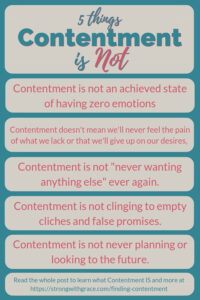How many of us are genuinely contented? For many, contentment is elusive at best. No matter how much they have, they aren’t content. Is this wrong? What does the Bible say about contentment? This article explores contentment and the Bible.
What is Contentment?
 According to the Merriam-Webster dictionary, contentment is the quality or state of being contented. To be contented is to feel or show satisfaction with your possessions, status, situation, or life in general. To be content isn’t a bad thing!
According to the Merriam-Webster dictionary, contentment is the quality or state of being contented. To be contented is to feel or show satisfaction with your possessions, status, situation, or life in general. To be content isn’t a bad thing!
What does the Bible say about Contentment?
There are some twenty-five verses in the Scriptures regarding contentment. We’ll look at a few of them.
1 Tim 6:6
6 But godliness with contentment is great gain.
This Scripture is in the context of false teachers who were motivated by money, and their ultimate goal was to enrich themselves, and operated under the misconception that godliness was a means to financial gain. But Paul countered that “godliness” combined with “contentment” was the means to gain. But not just gain, but “GREAT gain.” Godliness is great gain by itself when accompanied by contentment. Godliness does not come and go with the qualms of material wealth. Godliness, with contentment, is wealth unrelated to one’s bank account and assets. The false teachers had it in reverse.
In order to have contentment in Christ, there are four aspects concerning the possessions of our life:
(1) We must be grateful for what God has already allowed us to have.
(2) We must overlook what we do not have.
(3) We must refuse to covet what others may have.
(4) We must be thankful to God for all his gifts (4:3-4). Thanksgiving is the result of contentment.
If we fail to make these aspects a part of our psyche, our contentment will diminish.
As for gain, the benefits or profit that inspired the false teachers were neither lasting nor could result in contentment. Their earthly profits would be left behind, as verse 7 reads, “For we brought nothing into this world, and it is certain we can carry nothing out.” What brings great gain are eternal values. We quit contributing to our eternal accounts when material treasures become our focus. Whatever gains we may experience in this life mean nothing if they cause us eternal bankruptcy (see Matt 6:19-24). As Jesus said in Mark 8:36, “For what shall it profit a man, if he shall gain the whole world, and lose his own soul?”
The bottom line is we should place our focus on God and center our desires on him (“godliness,” Matt 6:33), and we should be content with what God is doing in our lives (Phil 4:11-13).

Another prominent Scripture regarding contentment is Hebrews 13:5-6 which reads:
5. Let your conversation be without covetousness; and be content with such things as ye have: for he hath said, I will never leave thee, nor forsake thee.
6. So that we may boldly say, The Lord is my helper, and I will not fear what man shall do unto me.
The Greek word translated as conversation means lifestyle. Christians should live a lifestyle that doesn’t exercise covetousness—that does not covet. But they should live a lifestyle that is content with what they have. Having a passion for worldly materialistic things and greed is a great evil because they show dependence on money rather than on God. The remedy for greed is contentment.
Covetousness additionally demonstrates that an individual cares more about items they can see than spiritual assurances they cannot see in the present.
Our contentment should be in what God provides, not in what we can achieve ourselves. Money cannot save us from the punishment of God. Money itself cannot even yield contentment. Most individuals often discover that money, rather than deliver contentment, fails to live up to their expectations. This disappointment explains why there are so many miserable wealthy individuals. However, where money disappoints, God does not. For God has said, “I will never fail you. I will never forsake you.” Faith in this promise of God keeps us in check and reminds us that God has given us all we need (Phil. 4:19).

The bottom line is that money cannot guarantee security; only God can truly help us. While we are not guaranteed earthly possessions, we are assured that God is our helper. He looks after His people and gives them what they need. Every Christian can say with conviction that the Lord is my helper (Ps 118:7).
The Apostle Paul knew this better than anybody. For he wrote in his letter to the Phillippians
In Philp. 4:11-12
11. I am not saying this because I am in need, for I have learned to be content whatever the circumstances.
12. I know what it is to be in need, and I know what it is to have plenty. I have learned the secret of being content in any and every situation, whether well fed or hungry, whether living in plenty or in want.
Paul acknowledges in this passage that he had learned an essential secret to the Christian life: that he could be content with whatever he had despite his external circumstances. Paul had to learn this, as do we because contentment is not a natural human response. The Greek word translated content means “self-sufficient” and independent of others. Paul used this term to indicate his independence from everything but Christ since Christ was the sole source of Paul’s life, as he stated in verse 13, “I can do all things through Christ which strengtheneth me.
Paul affirmed that his capability was in Christ alone, who provided him with the strength to cope with all circumstances.
The last Scripture to look at regarding contentment is found in Matt 6:33, which reads:
33. But seek ye first the kingdom of God, and his righteousness; and all these things shall be added unto you.
We, as Christians, must resolve the issue of priorities. We must be different from unbelievers whose primary concerns are comfort, security, money, fashion, etc. Followers of Christ seek first the kingdom of God and His righteousness. The word “seek” is a present imperative. It is
a command to accomplish a perpetual obligation. To “seek the kingdom” means to submit to God’s sovereignty here and now and to work for the future arrival of His kingdom.
To “seek His righteousness” means to work at living as God requires, to indeed seek these “first” calls for total loyalty and commitment. It means to turn to God first for help, to fill our thoughts with his desires, to take his character for our pattern, and to serve and obey him in everything.

The question to ask is, what is most important to us; what do we“seek first”? Is it people, objects, goals, money, pleasure? These and additional desires all compete for precedence. Any of these can quickly bump God out of first place if we don’t actively choose to give him first place in every area of our lives. Once we get our priorities right, Jesus promised to add all “these things” to us. When we seek his kingdom first, God takes care of our needs.
Conclusion
How can we learn to be content? We must make every effort to live with less rather than desiring more, give away from our excess rather than hoarding more, and appreciate what we have rather than resent what we’re missing. We must see God’s love expressed in what he has provided and remember that money and possessions will all pass away (Mark 13:31).
We become content when we realize God’s adequacy for our needs. Christians who become materialistic by their actions are saying that God isn’t taking care of them the way they want. This insecurity can lead to the love of money, whether we are rich or poor. The only remedy is to trust God to meet all of our needs.
Godliness with contentment is great gain!
Amen
Questions, comments, and concerns may be left below.
Blessings!

Hi. I really enjoyed this. But it has so many awesome tips for life. In particular being grateful for what you have and not focusing on just what you want or what other people have. Because that can really drive you crazy and you miss out on all the good things in your life.
Amen, Jake – Thanks for commenting!
In the world in which we live, there are so many people who are not content and the interesting part is many of these people have the means or money but they are still not content always wanting money more. But when we are in Christ and understand the ways of Christ will cause us to see life through His eyes and will cause us to be thankful and content in our condition. Thanks for sharing.
Amen, Norman – We must focus on what we have, be thankful, and not worry about what we don’t have.
Thanks for commenting!
The Christian Advocate is an awesome website to learn the bible and more. I honestly feel I am contented with my life as it is in my senior years. We always want to improve ourselves and our lives, so does that mean that we are not contented what do you think?From what I read in your article, I do feel I can say that I am contented. I am grateful for what I have especially God, and material things have never made me happy as much as doing things for others.Awesome article,Jeff
Greetings, Jeff – I appreciate your encouraging words regarding the Christian Advocate. I think we should continue to improve ourselves, but not to the extent that it’s obsessive. Balance is the key to life. As we seek to improve, we must also be grateful for our present circumstances. They could always be better, but they could also be worse.
Thanks for commenting!
This is a great reminder for daily life. It’s so easy to forget what is really important. I need to be satisfied that what I have is enough. That is easy to lose hold of, though. God is enough for all aspects of my life, but I often fret over the things I don’t have. Contentment can be an elusive feeling. When I am working and saving, how do I know if I crossed over to being greedy and discontentment?
– Scott
Greetings, Scott – When working and saving become your main focus in life, you’ve crossed the line into idolatry. Balance is the key to life. While working and saving are positive aspects of our lives, we must use wisdom, and keep them in their proper perspective.
God and His Son are to be our primary focus.
Thanks for commenting!
Your post really got me thinking. Can a person be really content without Jesus Christ? Someone who has amassed a billion dollars for example, should ordinarily be in a position to live lavishly for the rest of their lives and be content, but what we find is that they still pursue after the next billion and then the next. On the other hand, the Bible says in 2 Peter 1:3, that God has, by His divine power, given to us ALL THINGS that pertain to life and godliness. So even though God may choose to release His blessings into our lives in phases based on where we are on our walk with Him and His plan for each of us, we should always remain content. Another thought that came to mind was, can we be truly thankful to God if we are not content with what He has done or is doing in our lives? If we constantly focus only on the next thing we want God to do for us, we will never really be in a position of contentment.I enjoyed reading this thought provoking post.
Greetings Olusey – Ecclesiastes 3:11 reads, “He has made everything beautiful in its time. He has also set eternity in the hearts of men; yet they cannot fathom what God has done from beginning to end.”
NIV,
“God has placed eternity in the heart. This verse articulates that earthly pleasures and pursuits can never be completely satisfied. When we attempt to fill this eternity with earthly things, it only leads to disappointment and dissatisfaction.
Because we are created in God’s image, (1st) we have a spiritual thirst, (2nd) we have eternal value, and (3rd) nothing but the eternal God can truly satisfy us. God has built in us a restless yearning for the kind of perfect world that can only be found in his perfect rule. He has given us a glimpse of the perfection of his creation. But it is only a glimpse; we cannot see into the future or comprehend everything. Therefore, we must trust God now and do his work on earth.
Thanks for commenting!
This article provides a deep and insightful exploration of what it means to be content from both a practical and biblical perspective. The definition of contentment, as provided by the Merriam-Webster dictionary, sets a great foundation. It’s clear that true contentment is about finding satisfaction with what we have, which is a powerful message in today’s materialistic world.The biblical references offer profound wisdom on the subject. I found the discussion on 1 Timothy 6:6 particularly enlightening.I also appreciate the practical steps mentioned for cultivating contentment in Christ: being grateful for what we have, overlooking what we don’t, refusing to covet others’ possessions, and being thankful for God’s gifts.Overall, this article is a wonderful blend of practical advice and spiritual truth. It not only defines contentment but also provides a roadmap for achieving it in a way that honors God.
I thank you for your heartfelt comments, Kavitha – be blessed!
What a beautifully articulated article on the profound significance of contentment as taught in the Bible. The exploration of biblical contentment reminds us that it is not merely about being satisfied with our material possessions but about finding deep and abiding peace in God’s provision and presence.The reference to Philippians 4:11-13 is particularly impactful, as it highlights the Apostle Paul’s journey towards learning contentment regardless of his circumstances. This lesson is incredibly relevant today, where societal pressures often push us towards constant striving and comparison.Furthermore, the discussion on how contentment aligns with godliness, as mentioned in 1 Timothy 6:6-8, provides a powerful reminder that true wealth is found in spiritual contentment rather than material accumulation. This perspective encourages us to shift our focus from worldly gains to spiritual growth and reliance on God’s sufficiency.Overall, the article serves as a valuable reminder that contentment is a discipline and a gift that stems from our relationship with God. Embracing this biblical teaching can lead to a more fulfilling and peaceful life, rooted in faith and trust in God’s plan for us. Thank you for sharing such an insightful and inspiring piece.
Thanks for commenting, Ashley.
Have a blessed day!
Interesting. Thank you! I’m a Buddhist, so I find contentment in myself and my inner world, which sparks my true nature and endless moments of sheer joy and bliss. I just look inside to find my contentment and live compassionately without disturbing anyone. It’s great to have different views.
Question: By finding contentment in God don’t you lose touch with your true nature?
By finding contentment and getting close to God, you lose touch with your sinful
nature, and that’s a good thing. The closer you get to Him, the more of it you lose!
Thanks for commenting!
Hello,Wow! I love your site. As a strong Christian man myself, it is so refreshing to find a site that talks openly about the Bible. In today’s world, God is needed more than ever and I am praying that more and more people find your site and surrender their selves to Jesus Christ.Thank you for what you have accomplished with your site and God Bless You.Mike PowersCabin Living Today
Hi Mike – Thanks for your encouraging words. They are greatly appreciated.
Thanks for commenting!
Thank you for a great article. Your website seems to be a great place for those wanting to learn about the christian faith.I have found myself recently soul searching and looking for ways that I can improve as a person and in my life which is how I have stumbled on your site.I feel like life gets away from you and you disconnect so this article was a great reminder of what is really important. God Bless
Hi Clair – I’m happy that you discovered the site and that you were blessed by it. Drop by anytime!
Thanks for commenting!
This is a great article about contentment and the Bible. I especially appreciate the practical tips on how to achieve contentment. The Bible is a great source of wisdom and comfort, and it can help us to find contentment in any situation. In particular, I appreciate summarizing the individual topics in a point form.
I’m glad you were blessed by the article, Petr.
Thanks for commenting!
Hi,This article not only delves into the theological depth of contentment as taught in the Bible but also presents practical applications that resonate with everyday challenges. The author’s clarity and compassion in discussing this timeless concept make it accessible and relevant to readers seeking spiritual growth and inner peace in their journey of faith.RegardsNouman
Thanks for commenting, Norman.
Have a blessed day!
I think this is so well put together, and even though I am not a true follower of faith as presented, I do have my own beliefs that keep me very contented and oriented most of the time, it has pulled me through 2 very close encounters with death, so having some version of faith is an important factor in life’s journey. As I enter the last chapters of my life’s journey I will maintain my beliefs until my mind can no longer function. I accept other people’s beliefs openly and I hope each and everyone can find their own individual content that way
Ok, Robby, thanks for commenting!
It was a very interesting perspective on what is contentment. I know that we should feel content for what we have, but since I am also writing an online blog/business, I feel that I am not content with just the money I earn, but I want to earn more money through this businesses. I think money itself does not, like you said “yield contentment”, but it could lead/open other paths to contentment.
Greetings, Chris – I pray that the money you earn through your online business will lead to other paths of contentment.
Thanks for commenting!
The article effectively combines biblical teachings with practical insights on cultivating contentment in a materialistic world. It challenges readers to reconsider their priorities and embrace a mindset of gratitude and reliance on God’s provision. Overall, it serves as a timely reminder of the enduring wisdom found in Scripture regarding true fulfillment and spiritual wealth.Looking forward for more informative articlesKeep up the good work!RegardsSaba
Thanks for commenting, SJ!
Contentment, a lot of people are not content nowadays, I love the content in your article. The starting of the bible to the end. I Pray more people will pick it up and want to learn it. I agree completely about the money thing, money cant but happiness or more time on this earth. It so important to have faith that God is our great provider.
Amen, Samanthia! God is indeed our GREAT provider!
Thanks for commenting!
Wow this is great piece! I’ve never thought that I’d be so interested in an article about contentment. yes, we mustn’t covet other people’s possessions. We must always rely on TMH for everything; and work to the best of our abilities. You’ll always have someone who’s superior to you. Also, many people do spiritual pacts with evil entities to be rich. Never envy people but be thankful for everything you have at all times!
Amen Angelce! – Thanks again for commenting
This is a very interesting and helpful post on contentment and what we find in the bible about it. Contentment is much more than just having financial freedom or money. It includes being happy with your life, regardless of your financial situation.
But do you think that those that are financially secure, have less worries and are therefore more likely to be content? Do you have an opinion about contentment for those that do not have God in their lives? Or is there a direct correlation between contentment and religion? Thank you.
Greetings LineCowley – Those who are financially secure have one less worry…money. Are they more likely to be content…hardly. It merely leaves more room for the other issues of life. Let’s look at the experience of King Solomon, the wisest and richest king that ever lived. In Ecclesiastes 2:4-17 he wrote:
I made my works great, I built myself houses, and planted myself vineyards.
5 I made myself gardens and orchards, and I planted all kinds of fruit trees in them.
6 I made myself water pools from which to water the growing trees of the grove.
7 I acquired male and female servants, and had servants born in my house. Yes, I had greater possessions of herds and flocks than all who were in Jerusalem before me.
8 I also gathered for myself silver and gold and the special treasures of kings and of the provinces. I acquired male and female singers, the delights of the sons of men, and musical instruments of all kinds.
9 So I became great and excelled more than all who were before me in Jerusalem. Also my wisdom remained with me.
10 Whatever my eyes desired I did not keep from them. I did not withhold my heart from any pleasure, For my heart rejoiced in all my labor; And this was my reward from all my labor.
11 Then I looked on all the works that my hands had done And on the labor in which I had toiled; And indeed all was vanity and grasping for the wind. There was no profit under the sun.
12 Then I turned myself to consider wisdom and madness and folly; For what can the man do who succeeds the king? — Only what he has already done.
13 Then I saw that wisdom excels folly As light excels darkness.
14 The wise man’s eyes are in his head, But the fool walks in darkness. Yet I myself perceived That the same event happens to them all.
15 So I said in my heart, “As it happens to the fool, It also happens to me, And why was I then more wise?” Then I said in my heart, “This also is vanity.”
16 For there is no more remembrance of the wise than of the fool forever, Since all that now is will be forgotten in the days to come. And how does a wise man die? As the fool!
17 Therefore I hated life because the work that was done under the sun was distressing to me, for all is vanity and grasping for the wind. NKJV
We see in this passage that after all that Solomon had strived and accomplished, he “hated life.” Why? His accomplishments left him bitter because he pursued them earnestly for personal satisfaction. Personal satisfaction, by itself, is empty because we are alone in the enjoyment we receive.
Those who do not have God in their lives are not contented. More wisdom from Solomon is found in Ecclesiastes 3:11, which reads, “He [God] has made everything beautiful in its time. He has also set eternity in the hearts of men; yet they cannot fathom what God has done from beginning to end.” NIV
God has “set eternity in the hearts of men.”
This phrase means we can never be wholly fulfilled with earthly pleasures and pursuits. Because we are created in God’s image, (1) we have a spiritual thirst, (2) we have eternal value, and (3) nothing but the eternal God can truly satisfy us. This can shed light on why there are so many miserable wealthy individuals. They attempt to fill the void with worldly means (alcohol, drugs, clothes, education, cars, mansions, etc.), but it doesn’t work.
Scripture advises us in 2 Cor. 4:18, “while we do not look at the things which are seen, but at the things which are not seen. For the things which are seen are temporary, but the things which are not seen are eternal.” NKJV
Also, Colossians 3:2 reads, “Set your mind on things above, not on things on the earth.” NKJV
We should not ignore temporal things completely but place our primary focus on spiritual—eternal things for complete satisfaction.
I hope I’ve answered your questions. If not, please inform me.
Thanks for commenting, as always!
Contentment is the key to a peaceful life, which I believe is what God intended for us.Anytime in life I have lived from a place of gratitude it has always been easier to feel at peace.Even if you haven’t achieved all the things you want to yet, or don’t have the wealth that you desire, more likely than not, you have a roof over your head, food to eat, and your basic needs met, which is more that a lot of the world.Be Content. Be Grateful. Great article!
Amen, Mike, be content, be grateful!
Thanks for commenting!
Great article. And also very great reminder on how we should be careful not to allow material things to take the place of God. Especially that question of: what do we seek first. once that is answered its easy to test really and truly where our priorities are and if we are indeed content and depending solely on God. I must admit, i find myself seeking other things first many times, and until i ask myself that question do i realize it. Thanks for the reminder in this article.
Greetings, Kris – It is easy to fall prey to the world’s influences that can shift our focus away from God and his goodness. But as the Scripture reads in Eph 6:10-11, “Finally, my brethren, be strong in the Lord, and in the power of his might. Put on the whole armour of God, that ye may be able to stand against the wiles of the devil.“ This is how we overcome these temptations.
Thanks for commenting!